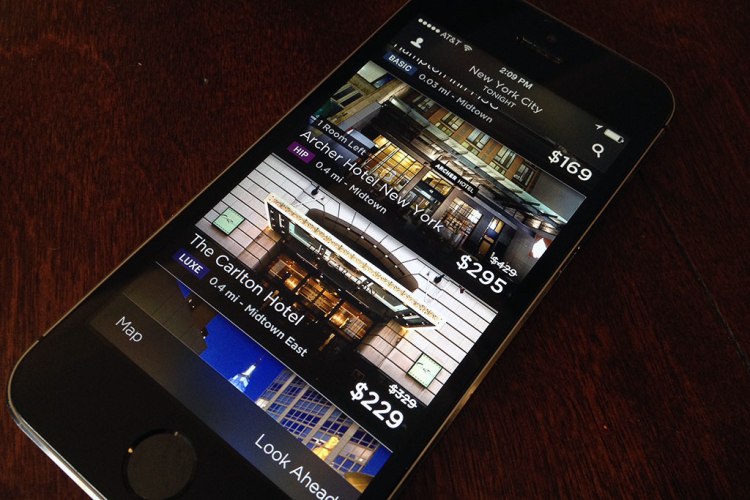This sponsored post is produced by Neumob.
I’m a pretty careful and annoyingly methodical pre-planner of my family’s vacations. So I was relatively stupefied when apps for “last-minute” flights and hotel bookings took off in a big way over the last several years. The most high-stakes “last minute” decision I’ll personally make is whether to read a book or watch a movie tonight — and even that’s likely been planned at least three hours in advance.
Yet the success of apps like Hotel Tonight, Hopper, Jetsetter, Roomlia, Last Minute Travel, Hipmunk, and countless others speaks to how the on-demand mobile economy has extended to big-ticket items like flights and resorts. Given these last-minute travelers’ desire for instant gratification and speed, it’s no surprise that nearly two-thirds of travelers who book same-day hotel reservations do so on a mobile device, as opposed to a desktop computer or via a telephone call (wait, via a what?).
MakeMyTrip even says that 24 percent of their app’s overall flight bookings are for same-day or next-day travel, compared with 17 percent on web. Turns out that there are many who are either embracing spontaneity or who suffer from exceptionally poor planning. Thankfully, there are more than a few apps for that.
Last-minute travel bookings bring higher revenue and margins for travel companies who’ve committed to making first-rate mobile apps. Yet apps that cannot load quickly and perform well across continents — especially in the mobile-first markets of China, Southeast Asia, and across Latin America — will find themselves quickly replaced by travelers who need to complete a booking immediately.
App owners and developers: let’s take a look at what goes into someone’s fabulously whimsical and spontaneous decision to “go on holiday” — and why every second counts once they do.
The scourge of the third-party call
Consider any travel booking app you’ve seen — particularly one that aggregates hotels or flights from many disparate sources. Chances are all of those photos, reviews, and descriptions — not to mention any native ads running within the app — are coming from externally-hosted third-party content sources or ad networks, and must be “called” by the app within milliseconds. This process weighs down an app. Each time a call occurs, additional lag time to retrieve all this useful content and data slows the app’s performance. This is further compounded by slow 2G, 3G, and even newer 4G networks around the world, which can often be congested and unpredictable.
For some apps — say, one for recipes — a user just might be willing to wait a few extra seconds for everything to load. Yet last-minute travel is by definition “of the moment.” Whimsical and spontaneous travelers will just as spontaneously close out a slow-to-load or otherwise poor-performing app and move on to a competitor’s app.
When faced with slow performance, 33 percent of mobile app users stopped using the slow app, 48 percent uninstalled said app, and 32 percent of these users went on to look for an alternative app. Ouch. Multiply that scenario by dozens, hundreds, or thousands of abandoned sessions, and any last-minute travel app with performance problems is also one suffering from lost revenues and probably a serious case of mobile app churn to boot.
An SDK to accelerate mobile travel bookings
Yet, virtually all travel apps have numerous and very necessary third-party SDKs (software development kits) among their many third-party calls. The average app now has 16.4 embedded SDKs, with some having over 40. They’re what serve up the ads; haul in the images and video content; supply the crash analytics and marketing tools to the app owners and developers; and so on.
While each SDK increases the “burden” or “weight” of the app on the mobile network, and thus helps contribute to the third-party call conundrum, they can also coexist with infrastructure SDKs that help speed up load times and in-app performance. Much as CDNs sped up websites in the 1990s, last-minute travel app owners can now readily add a Mobile CDN SDK to help their app’s “function” interact beautifully with all those other SDKs that contribute to their app’s unique “fashion” — and dramatically speed up travel app load times and in-app booking responses in the process.
Marvelously, the same SDK revolution that’s helped bloat apps while making them so incredibly powerful is simultaneously poised to accelerate their performance as well. A person’s or a couple’s impromptu (and often expensive) decision to travel should be as frictionless as possible, and the spoils accrue to app owners and developers who’ve figured out how to effectively cater to their whimsical, spontaneous, last-minute desires.
Jay Hinman is VP of Marketing at Neumob.
Sponsored posts are content that has been produced by a company that is either paying for the post or has a business relationship with VentureBeat, and they’re always clearly marked. The content of news stories produced by our editorial team is never influenced by advertisers or sponsors in any way. For more information, contact sales@venturebeat.com.

